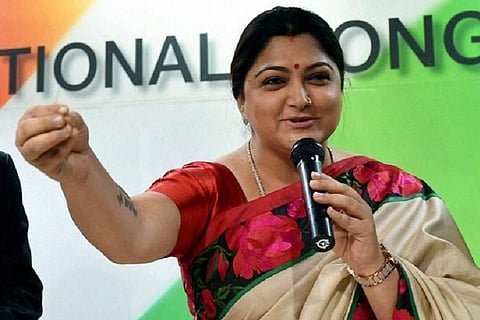

As a woman, a politician and a senior member of the Tamil film industry, Khushbu has been outspoken on women’s rights. Considering her progressive views on contraception and virginity (which got her into a controversy), we expected her to show some sensitivity and understanding when it came to questions of women’s safety and the role of popular culture in shaping social attitudes towards women.
In fact, when we drafted a petition calling out stalking in Tamil cinema, she was among the first few actors we approached through social media requesting her to support the cause. Of course, we did not hear from her then, but it is very disappointing to see her public defence of stalking in cinema while women around us are being harassed, molested, attacked and killed every day. Her response is not only insensitive and irresponsible, but also lends apparent legitimacy (coming from a woman) to the movie industry’s wilful ignorance and blatant misogyny.
To understand why her response is part of the carefully orchestrated myth in Kollywood that they do not contribute to the perpetuation of violence against women, let us consider her statement in parts.
First of all, she admits that heroes are shown relentlessly pursuing women ‘for love’. It is important to note here that in the movies, the woman concerned is most often shown as unwilling to entertain the hero’s advances, yet the ‘pursuit’ continues. The hero goes on to use what Khushbu apparently sees as “nice and positive ways” to win her love, which in our movies, include threats directed at the woman and her family, harassment in front of her teachers or colleagues, emotional manipulation and blackmail, verbal abuse and “eve-teasing.” None of these antics, which would legally qualify as stalking (under IPC 354D) and harassment (IPC 294, 509), are shown in the movies as offences that result in a conviction or punishment. Movies glorify and reinforce these forms of behaviour as ‘heroic’ traits, never dwelling on their criminality or the unpleasant consequences suffered by the woman.
Khushbu repeats the movie industry’s much-hackneyed defence that heroes are not shown “stabbing, maiming or killing women,” which is once again deeply problematic. This statement negates in a single sweep the trauma of being stalked, the inherent psychological violence involved in stalking.
STALKING IS VIOLENCE. Period.
That stalking often precedes much more violent acts like acid attack, murder and rape is a given. But that does not mean that stalking is in itself harmless and ONLY a precursor to potential violence.
Stalking causes fear, stress, anxiety, disorientation, loss of appetite and other forms of psychological harm to the victim. Women are forced to quit education or jobs, re-locate, change identities, confine themselves to their homes, and seek protection to venture into public spaces.
So, let us, once and for all, stop trivialising stalking as if it is merely harmless flirtation. ‘Consent’ is the key factor missing here. When a woman is ‘pursued’ against her will, her unwillingness is dismissed as irrelevant and her very personhood is denied. She becomes an ‘object to be hunted down.’
With respect to the gorier crimes, not every stalker kills, maims or rapes, but most certainly, every criminal who destroys a woman’s life is first a stalker. Popular culture, which has a major role in shaping social perceptions especially among impressionable children and teenagers, has to stop excusing, trivialising, normalising and glorifying the disgusting and criminal act of stalking.
As for movies not showing the hero killing or raping women, this is due to a combination of factors carefully manipulated by the movie industry.
First of all, in movies it is simply assumed that the movie goes on until the woman finally relents and says “yes” to the stalker. Every “no” from the woman is treated as a temporary setback, not a definitive climax. The heroine is never allowed to turn down her stalker permanently or get rid of the harassment by seeking police assistance, and the constant message reinforced is to ‘never give up’ the pursuit.
Further, since most movies stop with a fairy-tale ending of boy-gets-girl by marriage, the narrative arc about a woman’s goals in life gets completely sabotaged. In stark contrast, real life has complexities that go far beyond ‘getting the girl.’ These alternative or complementary tracks of narratives are never given importance, thus reducing the woman’s role to be nothing more than an object to desired, stalked and attained.
Khushbu, in her statement, reiterates the same idea that the woman has no exit-option: “Till the girl says yes, only nice and positive ways are used by him…” (italics added). Perhaps, Khushbu’s idea of ‘nice and positive’ includes body-shaming, inappropriate touching, slapping and singing obscene songs. Thanks, but no thanks.
As for Khushbu trying to blame the nebulous entity called ‘society’ in order to excuse the identifiable perpetrator (here, the Tamil film industry), we only want to point out that it is this same movie industry that volunteers to voice opinions on every social problem right from Cauvery water sharing to the ban on jallikattu. When members of the movie industry step up to use their celebrity status to share their views on subjects unrelated to their work, is it too much to ask for accountability in their own field?
Even as NGOs and individuals struggle to teach the idea of consent to youngsters, we would like more films to help us make a dent in the popular imagination and not undo our labour.
We need more of Pink and less, hopefully none, of Remo, since Khushbu herself believes that “people take home the message… that finally the hero always wins, the good will win over the bad.” We just don’t want the stalker-hero to win every time.